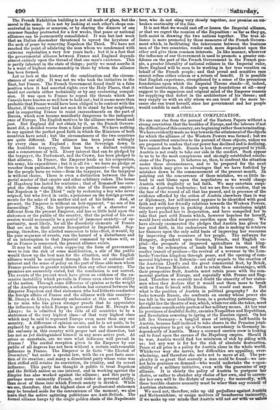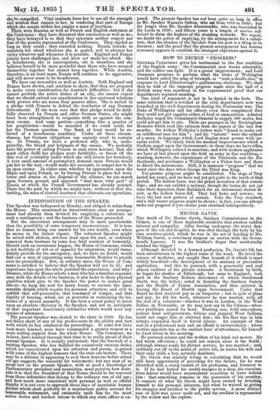THE AUSTRIAN COMPLICATION.
No one can rise from the perusal of the Eastern Papers without a strong conviction that the troubles of Europe, and the labours if not the difficulties of this country, are beginning rather than terminating. We have evidently made no way towards the attainment of the objects for which the alliance of the Western Powers was formed ; but we have committed ourselves to the pursuit of those objects, unless we are prepared to confess that our power has declined and is declining. We cannot draw back. Russia is less than ever prepared to yield. Austria is not ready to take our side in the conflict. Such appear to us to be the most conspicuous and strongly-established conclu- sions of the Papers. It behoves no, then, to confront the situation under these circumstances, and to be prepared for the next move which may give us advantages that we have forfeited by mistakes down to the commencement of the present month. In pointing out the concurrence of these mistakes, we as little in- tend to cast blame upon the negotiators as we would charge Austria with duplicity, or bad faith. We may entertain suspi- cions of Austrian tendencies ; but we are free to confess, that on the face of the recoid of all that has passed, and in presence of the evidence afforded by the action of Austria elsewhere than in war or diplomacy, her self-interest appears to be identified with good faith and with her friendly relations towards the Western Powers. Greater precipitancy in pushing Austria to a conclusion might only have pushed her to desperation, and have compelled her to take that part with Russia which, however hopeless for herself, would have entailed far greater sacrifice upon this country. We have already enumerated the pledges that Austria has given 'for her good faith, in the endeavours that she is making to retrieve her finances upon the only solid basis of improving her resources by improving the resources of her people. The railways for Hungary, dependent upon German, French, and English ca- pital—the prospects of improved agriculture in that king- dom by the redemption of lands held in base tenure, and the readier transit of produce—the revival of a -revenue in the Lom- bardo-Venetian kingdom through peace, and the opening of com- mercial highways in Bohemia—are only sequels to the creation of the Austrian Lloyd's and the great commercial fleet, by Bruck, the new Finance Minister. And to retain these advantages, with their prospective fruit, Austria must retain peace with the com- mercial portion of Europe, and especially with France and Eng- land. Therefore we scarcely need doubt the sincerity of her states- men when they declare that it 'would cost them more to break with us than to break with Russia. It would cost more. But what is the position of Austria in political geography P As she looks towards Russia, she confronts an enemy whose power she has felt in the most humbling form, in a protecting patronage. On her right lies the theatre of war, which, whatever side she takes, must absorb some considerable portion of her military means. At her rear lie provinces of doubtful fealty, enemies Neapolitan and Republican, and Revolution cowering to spring at the Russian signal. On her left lies Germany—a tangled mass of intrigue, half hostile to Austria, because half-inclined to take shares in the Prussian joint- stock conspiracy to get up a German ascendancy in Germany in- dependently of Austria. Many a crowned carrion crow is looking out to feast upon the carcass of the Hapsburg empire. Should it be war, Austria would find her minimum of risk by siding with us ; but any war is for her the risk of absolute destruction. Peace at all price is a policy for Austria alone in the whole world. Whichever way she moves, her difficulties are appalling, over- whelming, and therefore she seeks not to move at all. The per- plexity is so great that scarcely a man could be found—we can- not have geniuses on demand—who would undertake the respon- sibility of a military initiative, even with the guarantee of any alliance. It is clearly the policy of Austria to postpone her choice, or rather to abandon any choice of her own, and to surren- der her own -will to the dictate of necessity ; for assuredly, with these terrible chances necessity must be wiser than any council of Austrian statesmen.
We need not, therefore, rake up old prejudices against Austria and Metternichism, or assign motives of -treacherous insincerity, if we-make up our -minds.that Austria will not act with-us-unless
she be compelled. Vital instincts force her to use all the strength and wisdom that remain to her, in rendering that part of Europe which she counts within her empire a mass of inertness.
There were Russian as well as French and English statesmen at the Conference : they have discerned this conclusion as well as we ; they have betrayed to us that they entertain neither respect nor fear of the powers represented at the Conference. They cajoled as long as they could ; they conceded nothing. Russia intends to maintain her stand wherever she is posted, and to advance her views wherever and whenever it is possible. England and France jointly have challenged her, and have not made her afraid. She is treacherous, she is unscrupulous, she is dauntless, and she believes herself to be more powerful than those who have arrayed themselves together but cannot keep together. While Austria, therefore, is an inert mass, Russia will continue to be aggressive, and will never cease to be treacherous.
We have our necessities as well as Austria. Both England and France have shown, and continue to show, that they are prepared to make every consideration for Austria's difficulties : but if she cannot perform the active duties of an ally, she cannot expect that we should extend our consideration to her equivocal relations with powers who are worse than passive allies. She is united in a pledge with Prussia to defend the territories of any German Government. If she were sure that that pledge would be faith- fully observed by Prussia and other German States, she might have been strengthened to cooperate with us against the com- mon enemy. And some portion—something like a quarter of her perplexities—would be annulled if we could settle for I her the German question. One flank at least would be re- lieved of a treacherous auxiliary. Under all these circum- stances, her German obligations can scarcely avail to restrain us. In Prussia, we have a professed ally, who is, undis- dly, the friend and helpmate of the enemy. We probably aye the power of calling Prussia to such stern account, that she must either fulfil her pledges more faithfully, or throw off the thin veil of neutrality under which she still covers her treachery. A very small amount of peremptory demand upon Prussia would put her to the test—would make her succumb, or compel her to be an open enemy. In either case, whether by approaches upon the Rhine and upon Poland, or by forcing Prussia to place her terri- tories and armies at the disposal of the alliance, we can march upon German ground, and approach " that more vital part" of Russia at which the French Government has already pointed. There lies the path by which we might turn, without at first dis- turbing, the mass of central inertness that obstructs our operations.



























 Previous page
Previous page